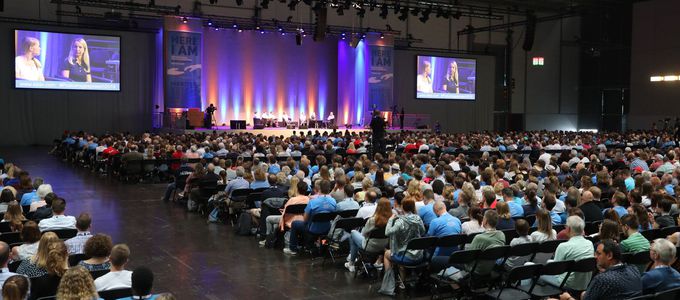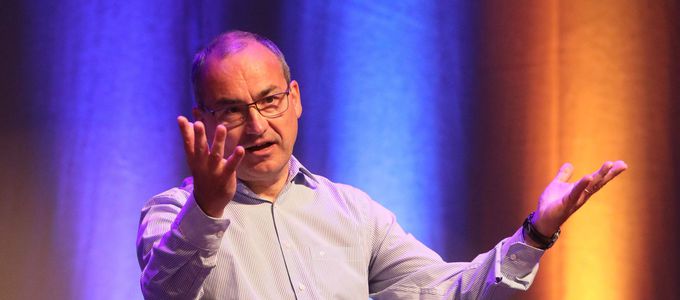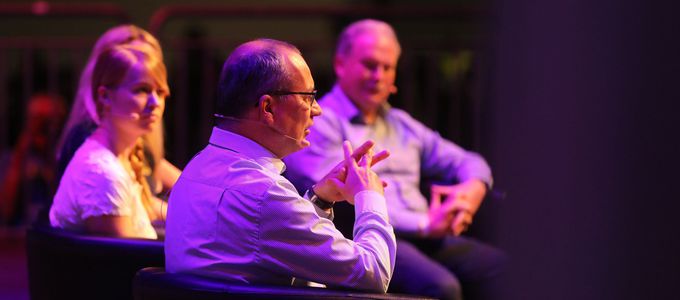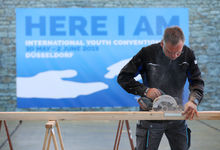The Church between the cultures
How much religion does the world need? How much congregation does belief need? And how much unity does the Church need? Answers were given in a panel discussion with the Chief Apostle at the IYC—and they are even correlated.
The event entitled “Here we are” attracted about 6,500 spectators in Düsseldorf and via live stream. On the podium next to Chief Apostle Jean-Luc Schneider were two young people, Nicole Hagel and Chris Harmsen, District Apostles Rainer Storck (Western Germany) and Jürg Zbinden (Switzerland), and Professor Stephanie Tritt, a medical doctor. The discussion was moderated by Friederike Gottschalk.
Judging by the reactions of the audience, the discussion had two focal points: the role of women in the New Apostolic Church and, above all, the cultural diversity in the global Church.
Church and culture
The District Apostles made clear that women are bringing their professional skills to bear in many functions. And when will they receive a ministry, the moderator asked. “I don’t know,” the Chief Apostle said, smiling. Next week the District Apostles will deal with the question of what the New Testament has to say about this. “The Bible says both—both in this direction and in the other direction.”
In terms of rules to uphold the unity of the Church, the Chief Apostle follows the mantra: as little as possible and as much as necessary. He was responding to a question about unity in the Church. Although the cultures differ, the teaching has to be the same everywhere. This not only applies to the music in the Church, but also to the development of teaching material, the way we go about pastoral care, and even the ordination of ministers. After all, “ministry will not work without a congregation. The minister must also be accepted by the congregation”. And there are cultural differences in the congregations.
God and the world
More and more people are getting along without God: this was the shared diagnosis at the beginning of the discussion. How come? Peace, prosperity, health—there has never been so much of this in the first world as now, the panellists agreed. And then there is still materialism, selfishness, and people’s reluctance to commit themselves. The overall renunciation of Christianity, in fact our beliefs, also affects the New Apostolic Church. However, the Chief Apostle made clear, “This concerns only five per cent of our members,” and made a point of focusing on the other 95 per cent. “Seen from a global perspective, the Church is continuing to grow.”
The world and belief
The world is in a permanent state of flux, there is pressure to perform, stress, burn-out, and depression: this is how Professor Tritt described the downside of progress. Why is the Church not more successful in establishing itself as a haven of peace and security, the moderator asked. Bad marketing?
First, the Chief Apostle said, the Church (“it is only an institution”) could do nothing to alleviate this, only faith in Jesus Christ can. Secondly, the gospel is not a product that can be changed to make it sell better. And therefore, thirdly, success cannot be measured by how many accept the gospel.
Belief and values
Is there a risk that the world will lose its Christian values. “Nope,” Chief Apostle Schneider said. “Not as long as there are Christians who live what they believe.”
The two young people on the panel had their very own practical tips on how this can be done. Nicole Hagel sticks to a song from the hymnal: “Take Jesus in your ship of life”. And Chris Harmsen from the Netherlands asks himself regularly: “What would Jesus do?”
Values and how to impart them
But they are also aware that religion and belief among the people in their immediate surroundings are not necessarily all that widespread. If not the gospel itself, must the Church then maybe not at least change how it conveys the gospel, the moderator asked.
“The framework plays a role,” District Apostle Zbinden said in response. But “the most important aspect is still the content”. Much has been tried, he said, referring also to other Churches. But it was seen, what counts in the end is the essence.
Article info
Author:
Date:
Keywords:
Andreas Rother
01.06.2019
International Youth Convention 2019 (IYC)






















